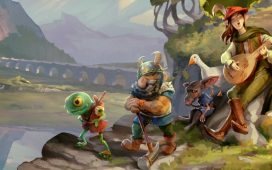Ancient China is brought to life in stunning form as Total War’s latest historical strategy game proves a franchise highlight.
 The Walking Dead new game Onslaught will let you play as Rick Grimes
The Walking Dead new game Onslaught will let you play as Rick Grimes
A lifetime spent playing video games has left us with an unexpectedly detailed knowledge of Nordic mythology, despite never having learnt a thing about it from any other source (Marvel doesn’t really count). We also surprise ourselves by how familiar we are with the historical figures and politics from Romance of the Three Kingdoms, the classic novel detailing civil war in Ancient China.
We’ve never read it, but we’ve played enough Dynasty Warriors games to be instantly familiar with the set-up and the major players. The problem is that the Dynasty Warriors games are awful, so it’s a relief to find the setting being used for a game that’s considerably more entertaining.
We should make it immediately clear that while the setting is the same this has absolutely nothing to do with Dynasty Warriors in terms of either creators or gameplay. It’s the latest in a long line of epic strategy games from British developer Creative Assembly, and, ignoring smaller scale spin-offs, the first mainline historical one since 2013’s Rome II. The last few years, the series has been concentrating on fantasy Warhammer games, but Three Kingdoms proves that a realistic historical setting can be just as engrossing.
This is the first time the Total War series has ever dealt with China in any major way and it’s immediately obvious that the setting is perfect for the franchise. There are three major factions, with a clear goal to reunite the country, but also dozens of smaller factions and hundreds of colourful and interesting characters to meet along the way. For years now Total War has been increasing the influence and importance of individual generals and leaders and the Three Kingdoms period presents the prefect way to humanise every battle and have it be more than just an abstract game of toy soldiers.
Three Kingdoms uses the same basic set-up as all the main Total War titles, with overall control of your armies taking place on a turn-based strategic map. You can play the whole game from here if you like, constructing buildings, training troops, and taking diplomatic and personal decisions. This works much like a simplified version of Civilization, but since the gameplay emphasis is very different that’s in no way a negative.
Total War puts much more emphasis on diplomacy and personal influence, with each character having their own special circumstances and abilities, from being popular with the peasantry, and thereby getting useful bonuses in terms of army recruitment, to a higher social standing that makes it easier to convince enemies to surrender or join your side.
Of key importance to diplomacy is the Chinese concept of guanxi, which reflects how you’re perceived by others and which Creative Assembly has characterised as a pre-Internet social network. It certainly works that way in the game, as you have to constantly work to keep all your allies on board and happy – never mind your enemies. Considering how common defections are there was a clear risk this could seem very random and uncontrollable, but thankfully that’s avoided by always making it very clear why characters respond the way they do and what would’ve made them do the opposite.
The most obvious draw in any Total War game is the real-time strategy battles. Here you control tens of thousands of troops all at once, from highly trained foot soldiers to cavalry, artillery weapons, and your generals (but, disappointingly, not naval units). You can let the computer auto resolve a battle on the campaign map if you want, but to do so would miss the whole point of the game. Especially as controlling battles is nowhere near as complex as it might sound, as all you’re really doing is pointing and clicking where you want your troops to go – with the all the fine detail and extra options not becoming necessary until you’re much further into the game.
In the Warhammer games, generals are extra important as they work almost like a MOBA style playable character. They’re only slightly less powerful in Three Kingdoms and many can take on dozens of cannon fodder soldiers at once and challenge opposing generals to epic duels (so, okay, that is a bit like Dynasty Warriors). But if that sounds off-putting to you the game also has a more realistic play mode that’s more in line with the previous Total War games and deemphasises the abilities of generals.
The less-realistic option is the obvious one to go for if you’re new to the series and if you choose to start with one of the characters with a lot of powerful generals and advantages then learning the ropes is impressively easy. The in-game tutorials do tend to throw a lot of information at you a little too quickly but there are some very helpful videos you can watch at your own pace, that make everything very clear.
As enjoyable as the Total War games always are their Achilles heel has always been artificial intelligence, which often struggles to offer a realistic, human-like response in battle and on the strategy map. Until SkyNET becomes a real thing that’s always going to be a problem but Three Kingdoms copes surprisingly well with the more complex diplomacy options, even if it still has a tendency to miss obvious opportunities on the battlefield.
The Total War games have always been unusually good-looking for strategy titles but Three Kingdoms is especially pretty, with a beautiful watercolour art style that manages to look both realistic and reminiscent of the artwork of the era. Just as impressive though is the user interface, which can be customised however you want and at a minimum has almost no clutter.
The awkward truth of the Warhammer games is that all the wildly diverse units and factions are intrinsically better suited to being used in a video game, which creates a problem when going back to the more nuanced reality of the real world. But with its sense of heightened realism Three Kingdoms manages to have things both ways and as a result becomes the best historical entry in the series so far.
Total War: Three Kingdoms
In Short: A hugely enjoyable mix of historical realism and exaggerated action that is both surprisingly accessible and filled with an impressive depth of tactical options.
Pros: The real-time battles are hugely satisfying and varied, making good use of the Three Kingdoms setting and characters. Complex diplomatic options are engaging yet logical. Great graphics and UI.
Cons: The artificial intelligence still is still far from perfect. No naval battles.
Score: 9/10
Formats: PC
Price: £44.99
Publisher: Sega
Developer: Creative Assembly
Release Date: 23rd May 2019
Age Rating: 16
Email gamecentral@ukmetro.co.uk, leave a comment below, and follow us on Twitter
















